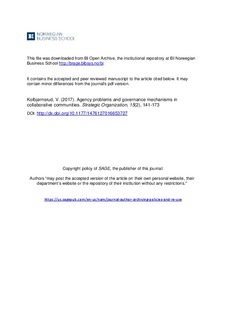Agency problems and governance mechanisms in collaborative communities
Journal article, Peer reviewed
Permanent lenke
http://hdl.handle.net/11250/2449924Utgivelsesdato
2017Metadata
Vis full innførselSamlinger
- Scientific articles [2181]
Originalversjon
Strategic Organization, 2017, 15(2), 141-173 http://dx.doi.org/10.1177/1476127016653727Sammendrag
Collaborative communities—where participants collaboratively solve problems and integrate their contributions—are increasingly popular organizational forms in a wide variety of domains. As with any cooperative effort, communities involve differential interests and information asymmetries, creating potential agency problems. I undertake an exploratory multiple-case study of four communities within the domains of enterprise information technology, sustainable products and services, drug discovery, and digital marketing and communication. I find that agency relationships in the collaborative communities are characterized by three distinct multiple-agency structures: commons, team production, and brokering. These are governed by four main categories of mechanism: (1) mutual monitoring, enabling self-regulation and peer-based control; (2) membership restrictions, regulating admission to the community; (3) values and rules, guiding member action and collaboration; and (4) property rights and incentives, regulating rights to community resources and distribution of rewards. I also identify contingencies between governance mechanisms and agency problems.
Beskrivelse
The accepted and peer reviewed manuscript to the article
